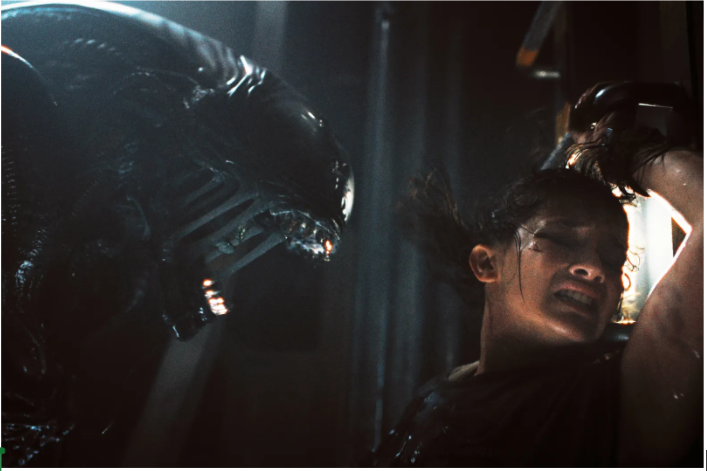I love Alien. Ever since I saw the original movie in theaters this May, I’ve been a massive fan of the franchise. So when I heard there would be a new entry, I was ecstatic. But now that I’ve watched it, I’m much less thrilled.
The plot of movies in the Alien series are simple: people are on a spaceship fighting a big evil Xenomorph alien. What made each entry special was the flair each director brought to the film, like James Cameron’s shoot-em-up antics (Aliens) or David Fincher’s nihilism (Alien³).
Romulus is essentially the same as the other movies. But it runs into a problem when there isn’t any inventiveness for the most part. It feels like two different movies: one written by creatives trying to make an experience that captures the heart of the originals while telling a new story, and one written by an AI that was fed the series and told to make the same movie but with British people. Unsurprisingly, one of these movies is better than the other.
Let’s focus on the positives for now. The score and effects are amazing. The visuals and sound design are stunning, and the movie demands to be seen in theaters. Whenever I was watching a bad scene like the facehuggers hatching, I could distract myself with pretty visuals and nice sounds, which live up to the originals’ greatness. The two leads, Andy (David Jonsson) and Rain (Cailee Spaeny) also perform impressively, even if Spaeny’s character was mostly one-dimensional and forgettable.
In addition, everything that feels like it was written with creativity in mind is excellent, notably the opening and the ending. There’s a slo-mo shootout near the end that’s so amazing that I would’ve believed it was from a good Alien movie if I’d seen it isolated. There were other scenes in the middle that completely gripped me with tension even if I knew what would happen because I’ve seen the original.
In the moments mentioned above, the creativity that made the original trilogy excellent really shines through. Unfortunately, it’s ruined by exhausting corporate pandering. Iconic lines from earlier Alien films are reused without any reason, the tagline is virtually the same as the original, and some scenes are almost shot-for-shot remakes from other Alien movies.
But the most glaring problem is the characters. In the real Alien movies, the side characters are occasionally irritating, but it’s always out of panic, making them feel more human. In Romulus, the writers said, “we need to have annoying people because this is Alien (not an actual quote),” and wrote the most aggravating people in almost any movie I’ve ever seen. They constantly harass the leads, make idiotic decisions even without danger, and have no reason other than “they’re just like that.” Jeffrey Spilker, the Sci-fi and Fantasy Literature teacher, had similar thoughts.
“Nothing about it stood out in particular compared to the other Alien movies,” Spilker said.
In an interview, Spilker talked about how the original Alien movies left viewers thinking about the concepts of a corporation-controlled world as well as scared of the movie itself. Unfortunately, Romulus can’t meet that bar.
“[Romulus] at the end was okay, but even that was just grotesque,” Spilker said. “It doesn’t give you any philosophical concepts.”
Usually it’s unfair to compare an original movie to a legacy sequel, but it’s very clear that the studio executives wanted people to talk about Romulus in the same vein as the original Alien. Therefore, it only seems appropriate to judge it as such. And in that regard, it falls flat in both the style and the story.
But Romulus highlights something that’s been going on for years: corporations controlling anti-corporate art.
The Alien series has always been anti-business. The villain of every movie (besides the extraterrestrials) is the business Weyland-Yutani. They either operate from the background, like in the first two movies (sending androids to rescue the Xenomorph and bring it back to Earth) or blatantly, like in Alien³ (explicitly saying their motivation is to save the alien no matter who dies).
Clearly, Romulus wants to be anti-capitalist. But that’s difficult when three-fourths of the script is played-out tropes from the originals and fan service that exists to elicit nostalgic applause.
Romulus isn’t the only recent movie to use anti-capitalism for its own benefit. Marketing for The Lorax (2012) used the pro-environment title character to sell printers and gas cars, which pollute the environment and go against everything Dr. Seuss pioneered.
Strange World (2022) had this same issue, but it’s made worse by the environmental message not being the focus of the story, along with being made by the multi trillion dollar company Disney to look like they cared about it.
Companies have a hold on anything that speaks out against them or their treatment of the environment. They make it powerful on the outside, but generic when you look a little bit closer. Anti-capitalism needs to find its voice again and start rebelling. A Xenomorph eating CEOs would be a good start. Final score: 5/10.









